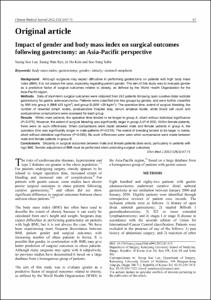Impact of gender and body mass index on surgical outcomes following gastrectomy: an Asia-Pacific perspective
- Keimyung Author(s)
- Ryu, Seung Wan; Kim, In Ho; Sohn, Soo Sang
- Department
- Dept. of Surgery (외과학)
- Journal Title
- Chinese Medical Journal
- Issued Date
- 2012
- Volume
- 125
- Issue
- 1
- Abstract
- Background Although surgeons may expect difficulties in performing gastrectomy on patients with high body mass index (BMI), it is not always the case, especially regarding patient gender. The aim of this study was to evaluate gender as a predictive factor of surgical outcomes related to obesity, as defined by the World Health Organization for the Asia-Pacific region.
Methods Data of short-term surgical outcomes were obtained from 243 patients following open curative distal subtotal gastrectomy for gastric adenocarcinoma. Patients were classified into two groups by gender, and were further classified by BMI into group A (BMI ≥25 kg/m2) and group B (BMI <25 kg/m2). The operation time, extent of surgical bleeding, the number of resected lymph nodes, postoperative hospital stay, serum amylase levels, white blood cell count and postoperative complications were accessed for each group.
Results Within male patients, the operation time tended to be longer in group A, albeit without statistical significance (P=0.075). However, the extent of surgical bleeding was significantly larger in group A (P=0.002). Within female patients, there were no such differences. When comparisons were made between male and female patients in group A, the operation time was significantly longer in male patients (P=0.019). The extent of bleeding tended to be larger in males, albeit without statistical significance (P=0.065). No such differences were seen when comparisons were made between male and female patients in group B.
Conclusions Disparity in surgical outcomes between male and female patients does exist, particularly in patients with high BMI. Gender adjustment of BMI must be performed when predicting surgical outcomes.
Keywords
body mass index; gastrectomy; gender; obesity; stomach neoplasm
- Publisher
- School of Medicine
- Citation
- Seung Soo Lee et al. (2012). Impact of gender and body mass index on surgical outcomes following gastrectomy: an Asia-Pacific perspective. Chinese Medical Journal, 125(1), 67–71. doi: 10.3760/cma.j.issn.0366-6999.2012.01.013
- Type
- Article
- ISSN
- 0366-6999
- Appears in Collections:
- 1. School of Medicine (의과대학) > Dept. of Surgery (외과학)
- 파일 목록
-
-
Download
 oak-aaa-00943.pdf
기타 데이터 / 262.47 kB / Adobe PDF
oak-aaa-00943.pdf
기타 데이터 / 262.47 kB / Adobe PDF
-
Items in Repository are protected by copyright, with all rights reserved, unless otherwise indicated.